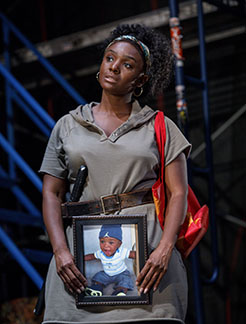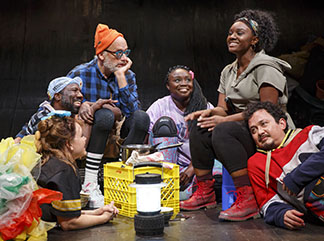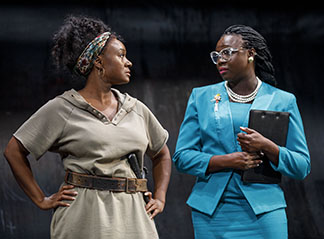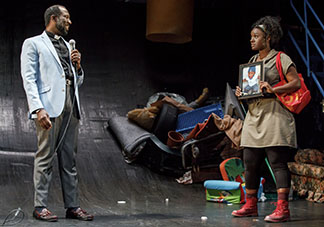By Lucy Komisar

From Hester in Nathaniel Hawthorne‘s Scarlet Letter, to Hester, La Negrita (the excellent Saycon Sengbloh) today, na¯ve trusting women with no economic independence are the victims of men, and then the victims of the social managers and critics, the moral cops of society, who blame them for being the victim.
In Suzan-Lori Parks‘ “In the Blood,” first staged in 1999, Hester had a child out of wedlock with her teenage lover, Chilli (Michael Braun), who promptly split. And then she has more. She is excoriated by a chorus of social betters who yell at the unmarried mother: “She don‘t got no skills, ˜cept one.” She‘s a “burden to society…. Bad news in her blood.” The writing on the wall is SLUT.
The play is surreal and stylized, with adults playing the kids, her “five treasures, five joys.” She has told the kids all their daddies died in the war.

They live under a bridge, and trash, the detritus of life, regularly arrives through yellow barrels that make a chute. The kids’ play is mashing tin cans or running up the slanting bridge support and sliding down.
Hester wears black pants, a beige polo shirt and high red sneakers. She is na¯ve, gullible, good-hearted and abused and insulted by everyone. Not as if she doesn‘t notice: “Bad boys writing on my home… a mean ugly word to hurt my feelings.” She has one of the kids wipe off SLUT.
But in a story where she is pilloried for having kids out of wedlock, the people who chastise her abuse her for sex. (Pilloried is a good word here, as it conjures up the Scarlett Letter era when that was a punishment.)

Her friend Amiga Gringa (Ana Reeder) owes Hester money but cheats her. She had sex with Hester in front of a paying audience.
The doctor (Frank Wood) says higher ups wants to spay her. Turns out he had sex with her
A welfare worker (Jocelyn Bioh) in a bright blue suit and pink heels wrapped in plastic assures us of her valuable role, “I walk the line between us and them.” But, “She is a low-class person… we have absolutely nothing in common.” She brings Hester home to a threesome. Hypocrisy could drown every adult Hester deals with.

A street corner preacher Rev D. (Russel G. Jones) who doesn’t want to part with the cash in his collection plate says, “Your clothes don‘t have to be torn…. You don‘t have to hate yourself,” but refuses to own up to his child.
The reverend wants to give to the “respectable poor. He says, “Gimmie foreign poor. Poverty exotica. Gimmie brown and yellow skins against a non-Western landscape, some savanna, some rain forest, some rice paddy.” Where the only English they know is “thank you,” said into the camera. So, how come the reverend slept with Hester, who had come to him for help? He explains, “Suffering is an enormous turn-on.”
Parks is brilliant in skewering a penchant for supporting exotic poor in faraway lands and ignoring or showing contempt for those at home.
The ensemble cast moves through their double roles with dark comedic aplomb. And director Sarah Benson almost makes one think gritty “documentary” instead of biting, sardonic play.
“In the Blood.” Written by Suzan-Lori Parks, directed by Sarah Benson. Signature Theatre, 480 West 42nd Street, New York City. 212-244-7529. Opened Sept 17, 2017, closes Oct 15, 2017. 10/9/17.

